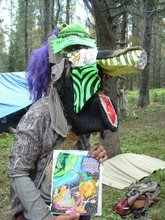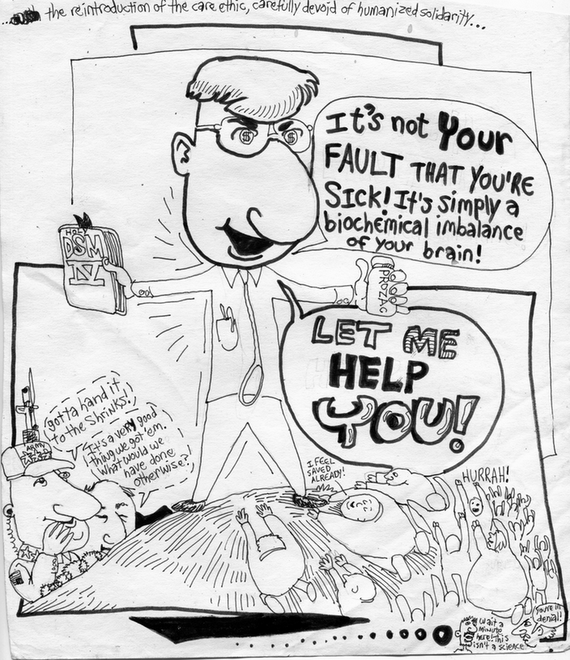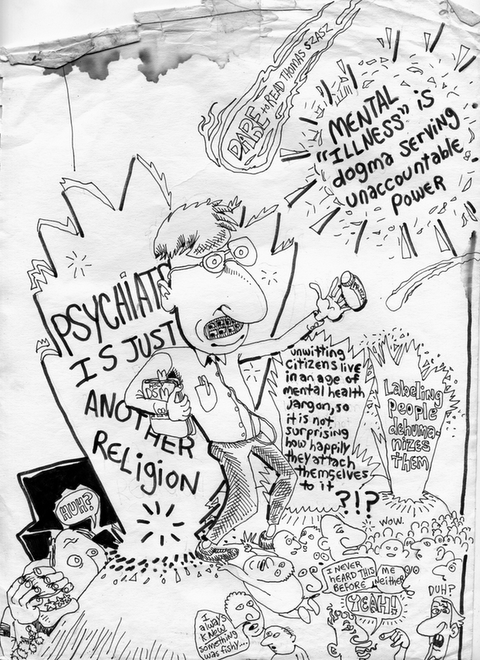I would like to envision, with your input, possible "initiation ceremonies" for those who are labeled crazy amongst us, and usually encouraged or coerced to seek so-called "professional help". The more creative your vision, the better. The more outlandish, the more excelling! Any other visionaries out there?
i got into this particular idea after reading the following:
"Instead of the degradation ceremonial of psychiatric examination, diagnosis and prognostication, we need, for those who are ready for it (in psychiatric terminology, often those who are about to go into a schizophrenic breakdown), an initiation ceremonial, through which the person will be guided with full social encouragement and sanction into inner space and time, by people who have been there and back again. Psychiatrically, this would appear as ex-patients helping future patients to go mad."
from:
http://www.laingsociety.org/colloquia/peaceconflict/divisions.levine.htm
There is some really good reading here. Here are some excerpts for the expected skeptics to think about:
"In the opinion of Dr. Thomas Szasz, psychiatry may be the new secular religion in an age of pseudo-science:
"The discerning reader may detect a faint note of familiarity here. Modern psychiatric ideology is an adaptation-to a scientific age-of the traditional ideology of Christian theology. Instead of being born into sin, man is born into sickness. Instead of life being a vale of tears, it is a vale of diseases. And, as in his journey from the cradle to the grave man was formerly guided by the priest, so now he is guided by the physician. In short, whereas in the Age of Faith the ideology was Christian, the technology clerical, and the expert priestly; in the Age of Madness the ideology is medical, the technology clinical, and the expert psychiatric.
"Thus psychiatry, like the nuclear family, becomes an instrumental motive force in the creation of the total social institution; through a process of mystification, both define normality and mould the individual into the one-dimensional shape of social utility. Laing calls this mystification a political act of "violence masquerading as love". "
and:
"'From the moment of birth, when the Stone Age baby confronts the twentiety-century mother, the baby is subjected to these forces of violence, called love, as its mother and father, and their parents and their parents before them, have been. These forces are mainly concerned with destroying most of its potentialities, and on the whole this enterprise is successful. By the time the new human being is fifteen or so, we are left with a being like ourselves, a half-crazed creature more or less adjusted to a mad world. This is normality in our present age.'
"Some people can adapt to this system. We call them normal. "Society highly values its normal man. It educates children to lose themselves and to become absurd, and thus to be normal," Laing tells us. "Normal men have killed perhaps 100,000,000 of their fellow normal men in the last fifty years." But some cannot adapt to this imposed normality. They break down. Instead, they devise a strategy to deal with their inability to hold their invalidated experience ant their sense of themselves together. As Laing puts it, "it seem to us that without exception the experience and behaviour that gets labeled schizophrenic is a special strategy that a person invents in order to live in an unlivable situation".
"Though, in [David] Cooper's phrase, the schizophrenic may look like someone whose "logic" is "ill", he is, in reality, someone, who has been made an invalid because his experience has been invalidated. For Laing and Cooper, schizophrenia is no 'something happening in a person but rather something between persons". Thus when one psychiatrist calls schizophrenia "a failure of human adaptation", Laing responds that it may as well be "a successful attempt not to adapt to pseudo-social realities". It all seems to be a matte of perspective: "Schizophrenia is a label affixed by some people to others in situations where an interpersonal disjunction of a particular kind is occurring. This is the nearest one can get at the moment to something like an 'objective' statement, so called."
"The validity of a definition is ultimately determined by the identity of the one who is defining. It is in this context that Laing argues: "There is no such 'condition' a 'schizophrenia,' but the label is a social fact and the social fact a political event." Seen from this radical perspective, all our definitions may have to be turned upside down ant inside out. "What we call 'normal' is", according to Laing "a product of repression, denial, splitting, projection, introjection and other forms. of destructive action on experience.... It is radically estranged from the structure of being." No wonder, then, that "the condition of alienation, of being asleep, of being unconscious, of being out of one's mind, is the condition of the normal man." On the other hand schizophrenia may be seen as an alienation from this alienation, where, "even through his profound wretchedness and disintegration", the patient may be "the hierophant of the sacred". Finally, "madness need not be all breakdown. It may also be break-through. It is potential liberation and renewal as well as enslavement and existential death."
"In _The Politics of Experience_, Laing describes how, in some instances, breakdown does become break-through; transforming the "schizophrenic experience" into a "transcendental experience". As depicted by Gregory Bateson, the schizophrenic embarks upon a voyage from the "outer" world of the "ego" to the "inner" world of the "self" -and back out again. He regards it as an archetypal journey that bears a close resemblance to descriptions of religious experience:
"It would appear that once precipitated into psychosis the patient has a course to run. He is, as it were, embarked upon a voyage of discovery which is only completed by his return to the normal world, to which he comes back with insights different from those of the inhabitants who never embarked on such a voyage."
Subscribe to:
Post Comments (Atom)



No comments:
Post a Comment